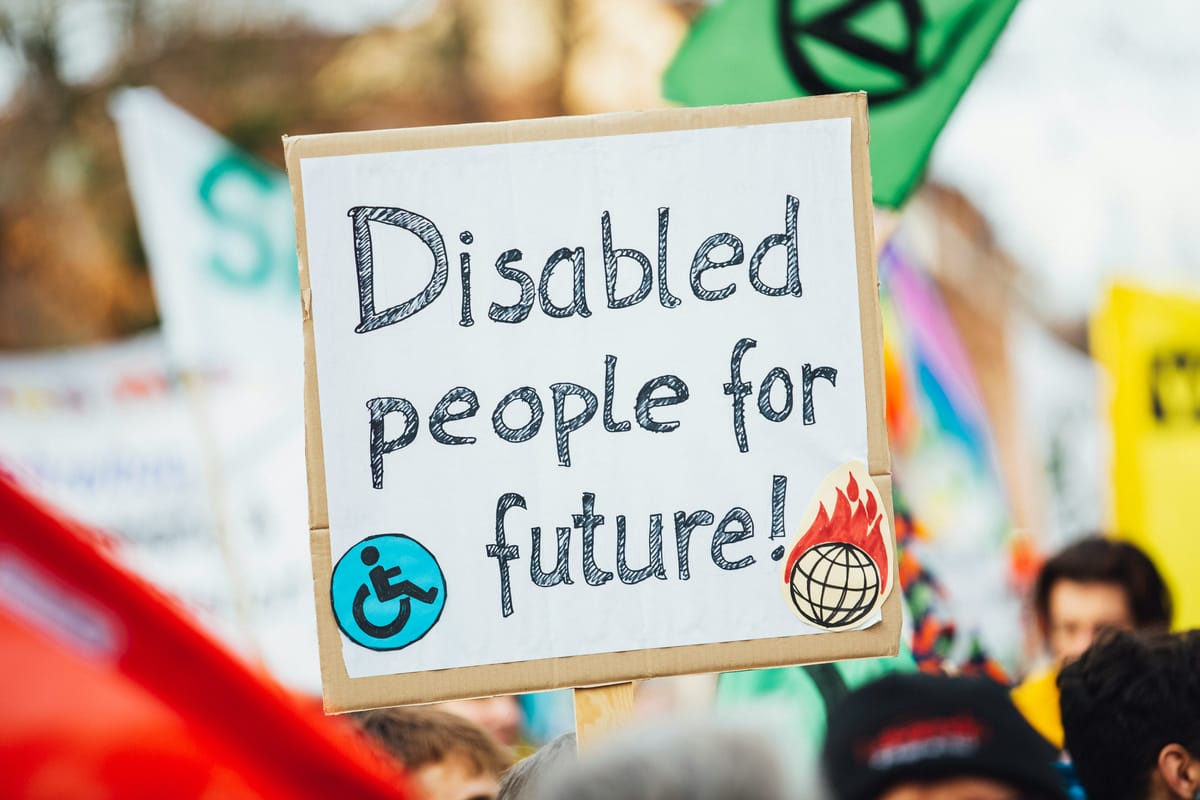"As more of us become disabled"
'I think we are in a moment where approaching disability justice and disability identity in a very coalitional way is incredibly important'

Long COVID, Disability and Identity
This is one of my regular newsletter columns written in my role as the Wisconsin Council of Churches Community Health Program Manager. You can see the original piece and other examples at the WCC website.
Miles Griffis published an article last week at The Sick Times asking a straightforward but difficult question. Why aren't HIV/AIDS advocacy groups taking the threat of Long COVID more seriously?
After all, the newer virus adds a layer of burden on people living with the older one. A previous HIV infection can also make worse many of the features of Long COVID. So it seems like it would be a good idea for the advocacy groups to promote awareness of Long COVID and the importance of avoiding infection. Yet so far, according to Griffis, they've been slow to do so.
To be clear, I offer this as a summary of the article, not to take a side in the discussion. That's not my place, nor the place of this newsletter. Instead, I want to explore some lessons we can take from overhearing the argument.
We know, for example, that HIV/AIDS is not the only condition that can make Long COVID worse or be worsened by it. It is particularly important to protect vulnerable members of the community. But it's in everyone's best interest to avoid Long COVID. The best way to do that? "Be up to date on [your] COVID vaccines," according to Michael Peluso, an infectious disease physician at the University of California, San Francisco.
At the same time, there is an inescapable element of disparity in Long COVID. Members of the transgender and bisexual communities may be more likely to develop the condition, says Griffis. And we know from the same survey that Hispanic respondents were the most likely to report Long COVID symptoms. Likewise, more women than men report symptoms, and more Black respondents than White.
Along the same lines, there is stigma about Long COVID, similar to that surrounding Myalgic Encephalomyelitis/Chronic Fatigue Syndrome. In fact, the two conditions overlap a great deal in symptoms and possibly outcomes. People who live with ME/CFS have argued for a long time that it needs to be taken more seriously. As Long COVID disables more people, the argument for deeper research and treatment of both conditions becomes more compelling.
As Sami Schalk points out, members of the disability community often organize around their specific disability. But as Long COVID intersects with other conditions, we may see increased emphasis in organizing across different segments. There may also be a new appreciation for disability as an identity. Griffis quotes Schalk: "'I think we are in a moment where approaching disability justice and disability identity in a very coalitional way is incredibly important' ... Building a larger movement is vital 'especially as more of us become disabled.'"
Indeed, it has been apparent for quite a while that Long COVID has the potential to be a "mass disabling event." Churches and other faith communities would be wise to develop strategies for care and support of those living with Long COVID. Lord knows they'll be doing it more often in coming years.
Faith communities would also be wise to spend some time investigating the intersections of disability justice, disability identity, and disability theology. How can people of faith respond to the disparities that lead to unequal outcomes from Long COVID and other conditions? What part have they played in creating stigma and ableism? How can they be advocates for better understanding and response to often-overlooked conditions? How can they come to meet and embrace the identity of disabled members of the community?
These are deep and worthy questions to wrestle with. They are also not exhaustive. There are issues about advocating for just workplace and education policies, overcoming the many obstacles placed in the way of disability benefit recipients, setting a universal basic income to sustain those unable to participate in the workforce. And all of this applies equally to people who aren't necessarily disabled, but who live with chronic conditions.
This is all work that should have been done already, as I'm sure readers understand. Good on you for the communities that have already taken it on, and no time like the present for those who haven't. COVID isn't going away anytime soon, which means neither is Long COVID. And that means these issues will only become more urgent. As the need grows, today's status quo will become less and less tenable.
As long as the list of issues I've named might be, it's still just scratching the surface. That might seem overwhelming. But Griffis and the experts he interviews suggest a simple starting place: talk about Long COVID. "If we don’t mention Long Covid whenever we talk about COVID, it just disappears from people’s minds," says one. So do the challenges it presents.
I'll pull on this thread as we go along, and encourage you to do the same. As always, I'm happy to hear your thoughts on the subject.
P.S.: One other lesson gleaned from Griffis' article: it's a good idea to follow up with your primary care provider 3 months after a COVID infection to screen for symptoms of Long COVID or other conditions associated with it.